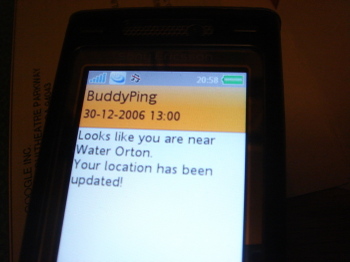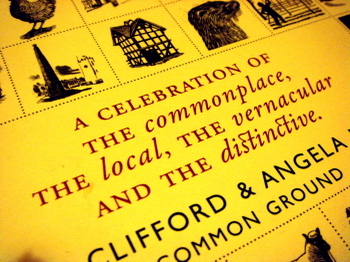I was playing with BuddyPing just after Christmas. While we were driving back down the M4. BuddyPing is a way of sharing where you are via your mobile, based on your proximity to a cellphone tower. So I idly pinged them on some anonymous strip of the motorway and got this response:
Water Orton? It immediately reminded me of a Flanders And Swann song - Slow Train (though I think the definitive version is by The King's Singers). Slow Train is an affectionate lament for the railway stations lost through the Beeching Cuts, it lists a bunch of eccentric and evocative English place names; Millers Dale, Kirby Muxloe, Mow Cop, Scholar Green, Midsomer Norton, etc which instantly take you back instantly to a pre-motorway connection to place which I, for one, have never actually experienced but still like the idea of.
It turns out from pinging buddyping that celltowers have similar names, on that single stretch of motorway I passed Widney Manor, Bishops Tachbrook, Ambrosden, Ludgershall, Waterperry and Loudwater. All great names that could have found a place in Slow Train. At first glance this seems wrong and counter-intuitive. Cell towers lurk at the far edges of the popular imagination as dark, probably malicious, impersonal things. Yet they're not that different to railway stations; communications technologies plonked down on the landscape but intimately connected to and dependent on that landscape. That tower/station has to be there if the whole thing is going to work.
What buddyping accidentally does is reveal the antique landscape beneath the technology, something that presumably the phone networks have little interest in, but which is actually quite powerful. It's not a geographical connection in the click-here-for-the-nearest-dry-cleaner sense (or the this-yellow-sticker-points-to-something-digital sense) but it's a reminder of the communities which have lived in and created the landscape we whizz through.
I suspect this is on my mind because I've been reading Unmitigated England and England In Particular
as half-hearted research for IDOTO. (Why are these books always just about England? Don't they have the stamina to cross any borders?) England In Particular's subtitle is 'A Celebration of the Commonplace, the Local, the Vernacular and the Distinctive' and it's written by the folk behind Common Ground, a noble group, but one I suspect that has little affection for mobile phone towers. Maybe they should reconsider that, maybe there's an opportunity to reconnect to localness via cell technology in the same way there was via the railways. Julian Cope's The Modern Antiquarian is concerned with even more ancient connections but already has its huge database of megalithic sites integrated with Google Earth. I'd love to feel a connection to The Modern Antiquarian through my k800i. Maybe the mobile phone will become some kind of psycho-geographical dowsing rod. Anyone want to sell that idea to Orange?


My Grandfather was a water deviner (if that's the correct terminology). It had to be seen to be believed.
Posted by: Ben | January 08, 2007 at 01:17 PM
Do you mean - it had to be believed to be seen?
Posted by: Colman | January 08, 2007 at 03:54 PM
Have you read Iain Sinclair's London Orbital? The M25 is his communication system lurking at the edges of the imagination (or London at least). There's also story in one of Bill Drummond's books about driving anti-clockwise around the M25 for 24 hours to release psycho-geographical forces. Lovely stuff.
Posted by: phil teer | January 09, 2007 at 03:29 PM